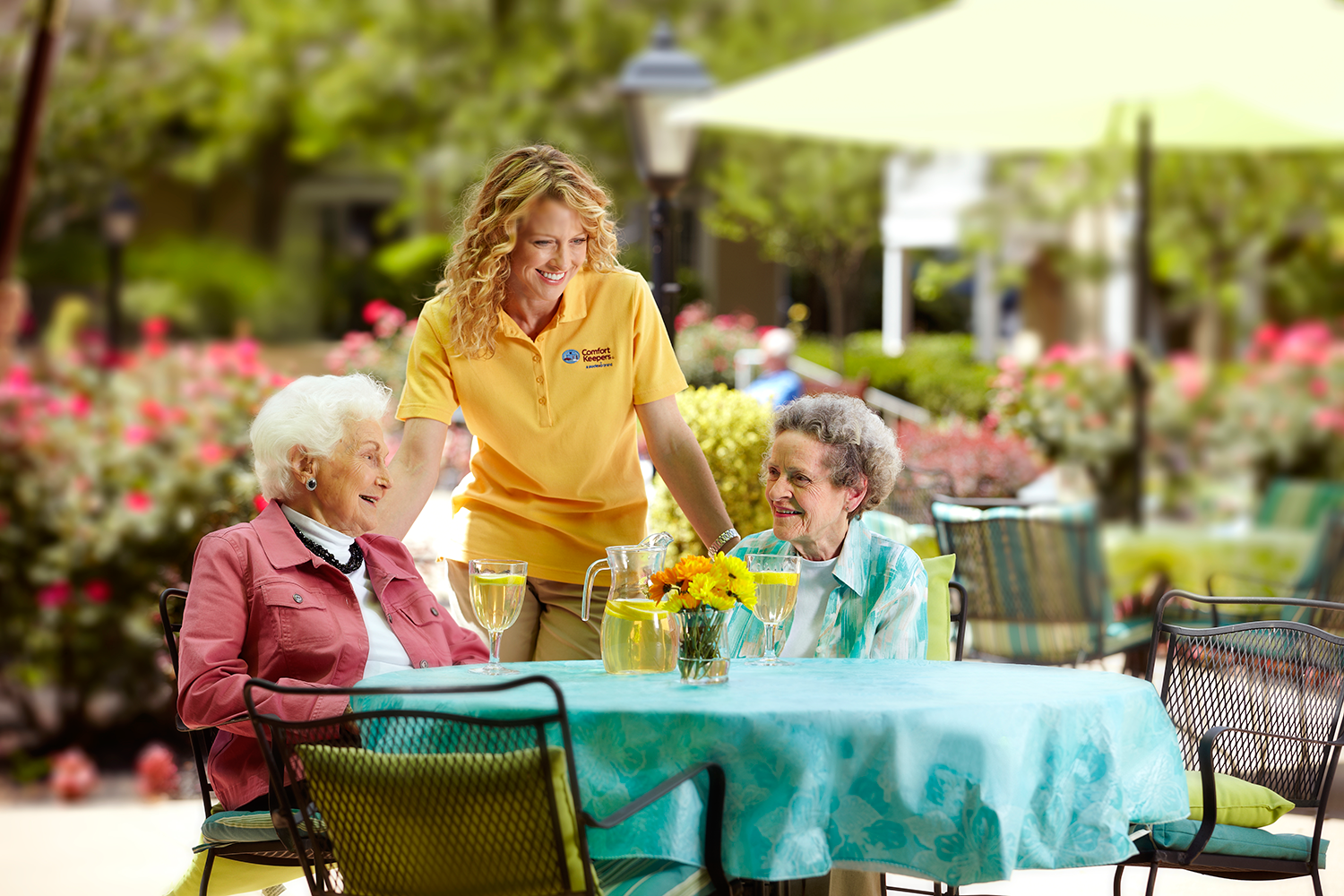Articles
Senior Care News / Highlights

Speaking in Tongues: Facts about Aphasias
Aphasia is a communication disorder that occurs when the language centers of the brain sustain damage from illness, dementia, or injury. In seniors, the most common cause of aphasia is stroke.
Learn More…
Physical Aspects of Senior Safety
There are many preventable actions that seniors and their families can take to ensure their safety and the safety of their loved ones. The U.S. Department of Health and Human Services reports that injuries, many of which are preventable, are the leading cause of disability and death for people of all ages.
Learn More…
Wellness through Creative Expression
As medical professionals seek solutions to improving patients’ outcomes, many are turning to complementary therapies to help patients overcome the psychological and emotional factors that may impede their progress. One such therapy is art therapy.
Learn More…
The Antidote for Caregiver Stress? Become Engaged
Approximately 15% of Canadian seniors live with some form of dementia, and caring for those afflicted creates significant stress on family caregivers. In addition to the time and cost impacts, caregivers suffer emotional, psychological, and social impacts as a result of their caregiving responsibilities.
Learn More…
Uncovering Pain in Seniors with Dementia
Many studies indicate that although dementia patients experience severe or chronic pain, they regularly receive fewer analgesics than healthy senior adults. This can primarily be attributed to the fact that while a healthy senior can verbalize pain and discomfort, dementia patients, especially those in the late stages, cannot.
Learn More…
Living with Arthritis
With more than 100 forms of arthritis and other rheumatic diseases, approximately one in three (33.8%) senior males and one in two (50.6%) senior females reported suffering from arthritis. Arthritis can prevent seniors from accomplishing the simplest tasks such a walking, preparing meals, picking up objects or even sitting for prolonged periods of time.
Learn More…
Pneumonia: Making the Most of At-Home Recovery
You have a senior with pneumonia who is about to be sent home to recover, and you are worried and because this person is over 65, her risk of readmission is greatly increased. A greater concern for you, though, is that the mortality rate for seniors with pneumonia is significantly greater than that in the younger population.
Learn More…
Alcohol Consumption in Seniors: A Delicate Balance
Numerous studies on the effects of alcohol consumption in seniors indicate that moderate drinking by seniors can have a positive impact on general health. However, there is also a concern that heavy drinking can have adverse effects, and that alcohol abuse is often missed in the senior population.
Learn More…
In-Home Care for Successful Recovery at Home
While the patients may be medically fit to return home, they are often not mentally and emotionally prepared for the in-home recovery process. Unfortunately, this can lead to patients returning to the hospital rather than recovering and thriving in the community.
Learn More…
Good Nutrition and Its Impact on Alzheimer’s Disease
Alzheimer’s is a progressive, incurable, fatal disease that usually strikes the elderly but can occur in people as young as age 40. This disease is the most common subclass of dementia, which is a term used for any number of diseases that affect memory and intellectual ability to the point of interfering with a person’s everyday activities.
Learn More…
Food Safety for Seniors: Avoiding Illness Through Proper Handling and Storage
The National Institutes of Health (NIH), Senior Health reports that approximately 76 million Americans get food poisoning, or foodborne illnesses, each year, and of those about 5000 die.
Learn More…
Healthy Eating: Simply and on a Budget
There is a lot of information on eating healthy and a lot of confusion to go along with it. What is certain is that we all know that we are supposed to eat healthy. Before we can do that, though, we need to understand what this means.
Learn More…
The Facts About Age-Related Macular Degeneration (AMD): What Seniors Should Know
Many seniors in their 60s and 70s have likely noticed some vision loss, and this can be a normal part of aging. However, an eye condition known as age-related macular degeneration, or AMD, can impact the severity of the vision loss that is due to aging. This is why it is important to know the basic facts about AMD. The good news is, these facts include preventive steps seniors can take to reduce the risk of developing AMD.
Learn More…
Help Seniors with Dementia Stay Engaged with Activities
In the early stages of dementia, many seniors show less interest in what were once their favorite activities, and that can be hard on family and loved ones who want to help them. Activities for people with dementia do not have to be strenuous to be beneficial, and senior care experts offer numerous recommendations when planning activities.
Learn More…
Heart-Healthy Foods
For many people, the risk of diseases such as Type II diabetes, high cholesterol, heart disease and coronary artery issues may be reduced by consuming healthy diets. While it is important to begin healthy eating habits early in life, it can be just as vital to good health when healthy eating practices are followed in later years.
Learn More…
Seniors and Post-Holiday Blues: Why it Happens and What to Do
As the end of the holidays approaches, many people feel relief knowing the hustle and bustle is nearly done. Yet the day after decorations are packed away and the leftovers are in the freezer, surprisingly that relief can be replaced with feelings of depression, especially for seniors.
Learn More…
Safe Snow Removal for Seniors: Find help, or follow best-practices
When the snow falls and accumulates, emergency room professionals can be assured of one thing – it’s likely they will see an increased incidence of injuries related to snow removal.
Learn More…
The Thyroid: a Small Gland, a Big Job
The thyroid is a small gland, shaped similar to a butterfly. It’s small enough to sit in just the lower portion of the neck, but the job it does for the body is huge. So when the thyroid gland is malfunctioning, the results on a person’s health can be devastating.
Learn More…
Healthy Aging: 5 Tips to Prevent Hearing Loss
Many changes that occur as we age may not be preventable. But did you know one common problem among senior adults—hearing loss—isn’t one of them?
Learn More…
Keeping Alzheimer’s Clients Safe Room-by-Room
Ensuring that your senior loved one remains as self-sufficient as possible, and yet safe around the house requires a delicate balance. For those caring for a person with Alzheimer’s or other forms of dementia, that challenge increases ten-fold.
Learn More…
Individualized Home Care Options
Long-Term Home Care, 24 Hour Home Care & Short Term Care Options Customized for You








